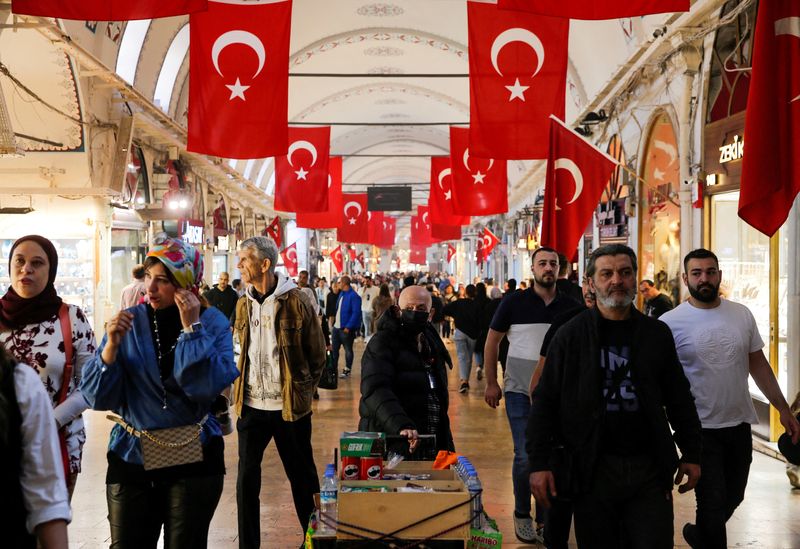Turkey’s economy faces ‘lost year’ no matter who wins election, insiders say
2023.05.10 11:26
2/2

© Reuters. FILE PHOTO: People shop at Grand Bazaar in Istanbul, Turkey, November 4, 2022. REUTERS/Dilara Senkaya/File Photo
2/2
By Orhan Coskun
ANKARA (Reuters) – Turkey’s economy is bracing for a “lost year” no matter who wins landmark elections on Sunday, political insiders say, even if the opposition pledges to tear down President Tayyip Erdogan’s unorthodox policies.
The main opposition alliance, which is leading in some opinion polls, promises to free up the economy and financial markets from state controls and return independence to a central bank that would then aggressively raise interest rates to cool inflation.
Erdogan’s ruling party said it would press on with its low-rates and high-growth programme despite inflation at 44% and depleted FX reserves after years of authorities stabilising the lira currency.
An opposition government could face economic and market instability as an overvalued lira weakens and as monetary stimulus is removed, analysts say. On the other hand, they say the current government could face its own volatility as its policy programme runs out of steam and could need a revamp.
An official from Erdogan’s ruling AK Party (AKP) said the economy, especially the cost-of-living crisis facing Turks, presented difficulties for its election campaign.
“I admit, the budget is not doing great. Election years are difficult. It will be like a lost year,” the AKP official said, adding stronger economic growth would be expected in 2024.
The official noted that the AKP could pivot to a more balanced programme if it wins the vote, given Erdogan’s recent comments that former finance minister Mehmet Simsek could return to help shape policies.
Simsek, who is well known internationally, also worked as a banker at UBS on Wall Street and Merrill Lynch in London.
“I believe that Simsek will come and provide support…and there would be a very serious forex inflow if he comes,” the official said.
Simsek could not be reached for comment. Erdogan’s office did not respond to a query about a “lost year” for the economy.
Financial markets are bracing for volatility after the presidential and parliamentary votes on May 14. A runoff between Erdogan and opposition challenger Kemal Kilicdaroglu is likely on May 28, polls show.
A senior opposition official said it would inherit the “wreckage” of Erdogan’s economy that would take time to fix because “there is no magic wand”.
A second opposition official said the new government would reform the bureaucracy as it seeks to understand the economic problems.
“It has become clear that 2023 will be a lost year but 2024 is not a year we can lose,” the official said, adding that 5% growth is expected in the next two years before it rises.
POTENTIAL ‘CHAOS’
The stakes are high after Erdogan’s drive to cut rates sparked a historic currency crisis in late 2021, and sent inflation as high as 85.5% last year. Economists expect inflation to rise from a low of 44% last month.
The election “will make or break macroeconomic stability in Turkey,” said Liam Peach, senior EM economist at Capital Economics.
An Erdogan victory raises the risk of “simultaneous currency, banking and sovereign debt crises down the line,” he said, while a Kilicdaroglu win provides a challenging route to “sustainably lower inflation in the future.”
Erdogan has prioritised growth, investments and exports by cutting rates and stabilising the lira currency via regulations and foreign reserves.
The heavy-handed approach send foreign investors fleeing in recent years, though many say they are preparing to return if Erdogan is ousted and interest rates are hiked.
“If the government changes hands, the ones who come will take over this terrible picture. And if they cannot explain this situation to the people, they will think that they created this wreckage,” said economist Mahfi Egilmez on his blog.
Wall Street bank Citi said a return to orthodox policies could attract $45-50 billion of foreign capital in 12 months.
Bilge Yilmaz, head of opposition IYI Party’s economy policies and a likely minister if it prevails, said the new government would take predictable steps including an independent central bank and an inflation-fighting regime with three-month targets.
“It is highly likely that there will be chaos in the debt and FX markets on May 15 (after the vote). So we need to pre-empt that and make it clear who is leading the new economy team and what is the policy. We can’t have uncertainty,” he said.
“Once the monetary policy looks credible, there will be a rush to Turkish assets.”








